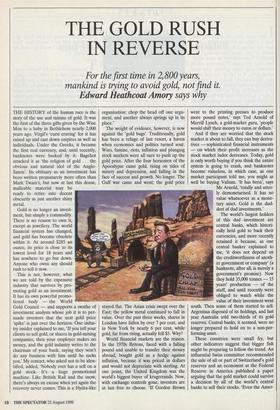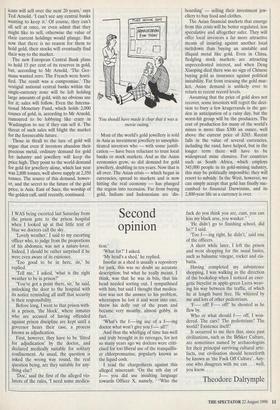THE GOLD RUSH IN REVERSE
For the first time in 2,800 years,
THE HISTORY of the human race is the story of the use and misuse of gold. It was the first of the three gifts given by the Wise Men to a baby in Bethlehem nearly 2,000 years ago. Virgil's `curst craving' for it has raised up and cast down empires as well as individuals. Under the Greeks, it became the first real currency, and, until recently, banknotes were backed by it. Bagehot attacked it as 'the religion of gold . . . the obvious and natural idol of the Anglo- Saxon'. Its obituary as an investment has been written prematurely more often than Mark Twain's, but now at last this dense, malleable material may be ready to retire into decent obscurity as just another shiny metal.
Gold is no longer an invest- ment, but simply a commodity. There is no reason to own it, except as jewellery. The world financial system has changed, and gold has become obsolete within it. At around $285 an ounce, its price is close to its lowest level for 18 years and has nowhere to go but down. Anyone who owns any should rush to sell it now.
This is not, however, what we are told by the expensive industry that survives by pro- moting gold as an investment. It has its own powerful promo- tional body — the World Gold Council — and supports a swathe of investment analysts whose job it is to per- suade investors that the next gold price `spike' is just over the horizon. One indus- try insider explained to me, 'If you tell your clients to sell gold, or shares in gold-mining companies, then your employer makes no money, and the gold industry writes to the chairman of your bank, saying they won't do any business with him until he sacks you.' My contact, who asked not to be iden- tified, added, 'Nobody ever has a sell on a gold stock. It's a huge promotional machine. Like British Rail and the snow, there's always an excuse when yet again the recovery never comes. This is a Hydra-like organisation: chop the head off one argu- ment, and another always springs up in its place.'
The weight of evidence, however, is now against the 'gold bugs'. Traditionally, gold has been a refuge of last resort, a haven when economics and politics turned sour. Wars, famine, riots, inflation and plunging stock markets were all sure to push up the gold price. After the four horsemen of the Apocalypse came gold, rising on tides of misery and depression, and falling in the face of success and growth. No longer. The Gulf war came and went; the gold price stayed flat. The Asian crisis swept over the East; the yellow metal continued to fall in value. Over the past three weeks, shares in London have fallen by over 7 per cent, and in New York by nearly 6 per cent, while gold, far from rising, actually fell $5. Why?
World financial markets are the reason. In the 1970s Britons, faced with a falling pound and unable to transfer their money abroad, bought gold as a hedge against inflation, because it was priced in dollars and would not depreciate with sterling. At one point, the United Kingdom was the world's biggest buyer of krugerrands. Now, with exchange controls gone, investors are at last free to choose. 'If Gordon Brown went to the printing presses to produce more pound notes,' says Ted Arnold of Merrill Lynch, a gold-market guru, 'people would shift their money to euros or dollars.'
And if they are worried that the stock market is about to fall, they can buy deriva- tives — sophisticated financial instruments — on which their profit increases as the stock market index decreases. Today, gold is only worth buying if you think the entire system is going to crash, and banknotes become valueless, in which case, as one market participant told me, you might as well be buying Valium. 'It has been', says Mr Arnold, 'totally and utter- ly demonetarised. It has no value whatsoever as a mone- tary asset. Gold is the dud- dest of dud investments.'
The world's largest holders of this dud investment are central banks, which histori- cally held gold to back their currencies, and more recently retained it because, as one central banker explained to me, 'it does not depend on the creditworthiness of anoth- er government or company' (a banknote, after all, is merely a government's promise). Now they hold 35,000 tonnes — 15 years' production — of the stuff, and until recently were obliged to watch while the value of their investment went south. Then some of them started to sell. Argentina disposed of its holdings, and last year Australia sold two-thirds of its gold reserves. Central banks, it seemed, were no longer prepared to hold on to a non-per- forming asset.
These countries were small fry, but other indicators suggest that bigger fish might be preparing to follow the trend. An influential Swiss committee recommended the sale of all or part of Switzerland's gold reserves and an economist at the Federal Reserve in America published a paper arguing that the gold market could survive a decision by all of the world's central banks to sell their stocks. 'Even the Amer- icans will sell over the next 20 years,' says Ted Arnold. 'I can't see any central banks wanting to keep it.' Of course, they can't all sell at once, or even admit that they might like to sell, otherwise the value of their current holdings would plunge. But now that there is no reason for them to hold gold, their stocks will eventually find their way to the market.
The new European Central Bank plans to hold 15 per cent of its reserves in gold, but, according to Mr Arnold, 'The Ger- mans wanted zero. The French were horri- fied. The result was a compromise.' The vestigial national central banks within the single-currency zone will be left holding large amounts of gold, with no obvious use for it; sales will follow. Even the Interna- tional Monetary Fund, which holds 2,000 tonnes of gold, is, according to Mr Arnold, rumoured to be lobbying like crazy in Washington to see if they can sell it. The threat of such sales will blight the market for the foreseeable future.
Those in thrall to the lure of gold will argue that even if investors abandon their precious metal, ordinary demand for gold for industry and jewellery will keep the price high. They point to the world demand for gold for jewellery alone, which last year was 2,800 tonnes, well above supply at 2,350 tonnes. The source of this demand, howev- er, and the secret to the future of the gold price, is Asia. East of Suez, the worship of the golden calf, until recently, continued. `You should have made it clear that it was a movie outing.'
Most of the world's gold jewellery is sold in Asia as investment jewellery to unsophis- ticated investors who — with some justifi- cation — have been reluctant to trust local banks or stock markets. And as the Asian economies grew, so did demand for gold jewellery, doubling in ten years. Now that is all over. The Asian crisis — which began in currencies, spread to markets and is now hitting the real economy — has plunged the region into recession. Far from buying gold, Indians and Indonesians are `dis- hoarding' — selling their investment jew- ellery to buy food and clothes.
The Asian financial markets that emerge from this crisis will be better regulated, less speculative and altogether safer. They will offer local investors a far more attractive means of insuring against another local meltdown than buying an unstable and illiquid metal like gold. Even in China, fledgling stock markets are attracting unprecedented interest, and when Deng Xiaoping died there was no sign of Chinese buying gold as insurance against political instability. Far from rescuing the gold mar- ket, Asian demand is unlikely ever to return to recent record levels.
Assuming that the price of gold does not recover, some investors will regret the deci- sion to bury a few krugerrands in the gar- den in anticipation of a rainy day, but the worst-hit group will be the producers. The cost of production for many of the world's mines is more than $300 an ounce, well above the current price of $285. Recent falls in the value of several currencies, including the rand, have helped, but in the longer term there will have to be widespread mine closures. For countries such as South Africa, which employs 345,000 people in its gold-mining industry, this may be politically impossible; they will resort to subsidy. In the West, however, we can simply accept that gold has finally suc- cumbed to financial Darwinism, and its 2,800-year life as a currency is over.

























































 Previous page
Previous page